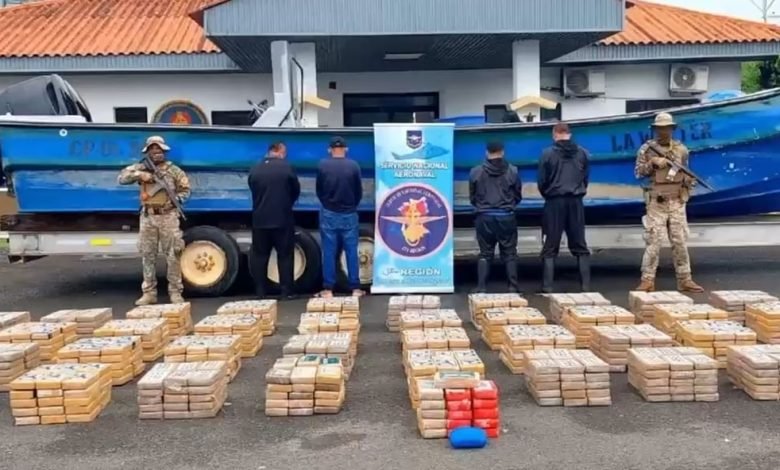
822 Tons of Narcotics Seized, 12,564 Arrested in $2.9B Anti-Drug Offensive
The UAE led one of history’s largest anti-narcotics operations recently, which resulted in the seizure of 822 tons of illicit drugs valued at $2.9 billion. Law enforcement agencies arrested 12,564 suspects worldwide during this massive two-month operation that spanned air, sea, and land[-4].
International cooperation has proven vital to curbing the global drug trade. The UAE and the International Security Alliance (ISA) coordinated this unprecedented initiative. Twenty-five countries and several international policing organizations joined forces to create a powerful united front against drug trafficking networks. This second operation by the ISA brought law enforcement agencies together worldwide to disrupt major drug supply chains and distribution networks.
UAE leads global coalition in $2.9B drug bust
The UAE played a key role in the International Security Alliance’s counter-narcotics operation that ran from June 10 to August 7. Law enforcement agencies spent months gathering intelligence, preparing, and studying smuggling routes to target drug networks in multiple continents.
The operation brought together 25 nations including Bahrain, Spain, Morocco, France, Italy, the Netherlands, and Slovakia. Through Ameripol, several Latin American countries joined the effort – Colombia, Argentina, Bolivia, Brazil, Chile, Ecuador, Paraguay, El Salvador, Guatemala, Panama, Venezuela, and Peru. Croatia and Belgium worked under Europol’s umbrella, while the Maldives, Jordan, and Nepal also participated.
Law enforcement teams launched coordinated raids by air, sea, and land that showed remarkable teamwork between agencies worldwide. The teams dismantled major parts of global drug trafficking networks worth AED 10.65 billion[61].
The operation helped improve field coordination between countries and created new ways to control drugs moving across borders. Teams gathered practical intelligence about emerging criminal groups and built stronger relationships between specialists.
The ISA, a 6-year old partnership started by France and the UAE, now has 11 member countries working together on common security issues. This alliance has successfully united efforts and built strong partnerships against international criminal threats.
How 25 nations coordinated the largest anti-drug operation
A groundbreaking counter-narcotics operation required unprecedented teamwork from 25 countries in multiple continents. Law enforcement, intelligence agencies, and border control units worked together after months of careful planning. Teams investigated smuggling routes and trafficking methods thoroughly.
Each participating country set up special task forces to track trafficking routes by air, sea, and land at the same time. ISA members, Ameripol participants, and Europol representatives shared intelligence through secure channels. The operation brought together specialized units from eight ISA member states, eleven Ameripol countries, and two Europol nations. The Maldives, Jordan, and Nepal also joined the effort.
Teams worked closely to spot new criminal networks quickly and shared their knowledge about advanced smuggling techniques. This teamwork strengthened the bonds between participating nations by a lot.
The operation created lasting partnerships between experts across continents. New coordination systems now help control cross-border drug flows better.
The International Security Alliance ran this operation by land, air, and sea all at once. It was their second soaring win of its kind, which shows how global security teams can work together more effectively.
What is the International Security Alliance and why it matters
The International Security Alliance (ISA), now 6 years old, emerged from a joint initiative between France and the United Arab Emirates to create a groundbreaking framework that addresses transnational security challenges. Eight nations formed the original alliance: the UAE, France, Bahrain, Morocco, Italy, Senegal, Singapore, and Spain.
ISA operates as a collaborative platform where Interior Ministries work together to curb organized and transnational crime. The alliance takes a unique approach by combining high-level strategic planning with hands-on field operations to achieve better results against criminal activities.
ISA does more than just react to security threats – it substantially shapes the international security agenda. This framework has helped the UAE become a key player in global security discussions. The alliance also strengthens relationships between specialized experts from member states, which optimizes field coordination.
Abu Dhabi hosts the Alliance Secretariat, which coordinates all joint projects. Yes, it is worth noting that ISA’s impact goes beyond day-to-day operations by creating active systems to stop cross-border illegal activities.
This mutually beneficial framework has become essential to tackle complex international security challenges through unified efforts and strategic collaborations at regional and global levels.
The massive anti-narcotics operation proves how effective international cooperation can be to curb global drug trafficking networks. Law enforcement seized 822 tons of illegal substances worth $2.9 billion, dealing a major blow to transnational criminal organizations. More than 12,564 suspects were arrested across multiple continents, showing the operation’s complete reach.
The UAE led this coalition, which shows its growing power to shape international security frameworks. Through collaboration between 25 nations at air, sea, and land checkpoints, the operation needed precise logistical planning and intelligence sharing. The International Security Alliance proved to be a powerful platform that brought everyone together for collective security action.
The operation built strong relationships between specialized units worldwide. It also created new ways to deal with cross-border drug flows proactively. ISA members worked with Ameripol countries and Europol representatives to create a united front against sophisticated trafficking networks.
Drug traffickers keep finding new and complex ways to smuggle their products. But this operation shows that when countries work together, they can break up major supply chains and distribution networks. Other global security initiatives will likely use this operation’s framework as their model.
Security experts call this operation a turning point in fighting international drug trade. The lessons from this massive coordinated effort will influence how we fight transnational crime for years to come. Law enforcement agencies worldwide now have better intelligence about new criminal networks. They’ve also improved their field coordination and built stronger relationships that exceed geographical boundaries.






